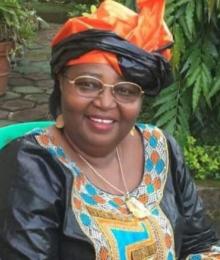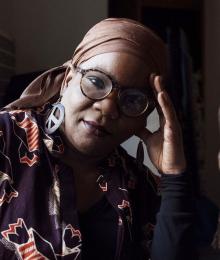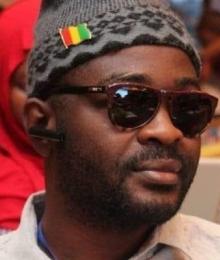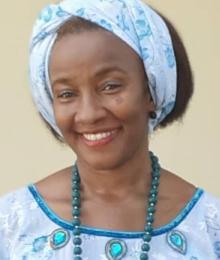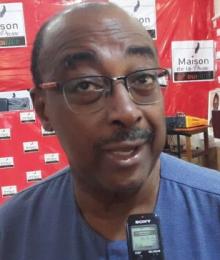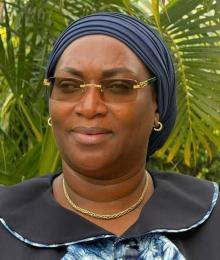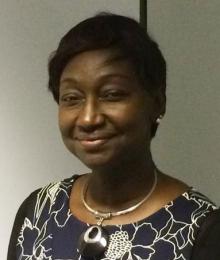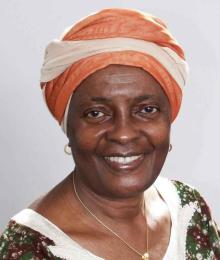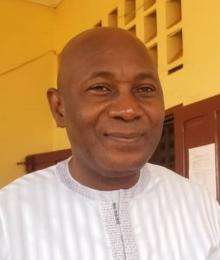
Abdourahmane Sano, born in 1958 in Kindia, Guinea, is a prominent figure in Guinean civil society. A former Minister of Livestock and Fisheries under the CNDD military regime, he is widely recognized for his integrity and commitment to democracy. After a successful career in trade event organization and the promotion of international commerce, Sano emerged as a key leader of civil opposition in Guinea.
As the coordinator of the National Front for the Defense of the Constitution (FNDC), he spearheaded the movement against President Alpha Condé’s bid for a third term, facing legal persecution and state repression. Despite mounting pressure, Abdourahmane Sano remains a steadfast advocate for the rule of law and good governance, embodying the hope for a more democratic and prosperous Guinea.
Introduction
Abdourahmane Sano, commonly known as "Doura," is a prominent figure in Guinean civil society. Born in 1958 in Kindia, this former minister and businessman has distinguished himself as a staunch advocate for democracy and the rule of law in Guinea. His unconventional journey has taken him from classrooms to the highest levels of government, before becoming one of the leading voices against President Alpha Condé's bid for a third term. As the national coordinator of the National Front for the Defense of the Constitution (FNDC), Sano embodies peaceful resistance against authoritarian tendencies. His unwavering commitment to fundamental freedoms and good governance makes him a central figure in Guinean political life.
Early Life and Education
Abdourahmane Sano was born on March 27, 1958, in Kindia, a town about a hundred kilometers from Conakry. He is the son of the late Elhadj Sékou Sano and Hadja Fanta Sylla. He spent his childhood in the “city of citrus,” where he attended primary school. He then pursued his secondary education at the Kindia middle and high school from 1975 to 1979, earning his baccalaureate in 1979.
After high school, Sano enrolled at the Gamal Abdel Nasser Institute in Conakry. In 1984, he graduated with a Master’s degree in Accounting from the National School of Administration at the University of Conakry. During his university years, he lived with his adoptive father, the strict teacher Elhadj Moussa Sano, in the Coronthie neighborhood of Kaloum.
The year he graduated coincided with a major turning point in Guinea’s history: the death of President Sékou Touré and the military’s seizure of power in April 1984. Like many young graduates at the time, Sano underwent “civic training” at the Kèmè Bouréma Infantry Training Center (CFIK) in Kindia. This experience marked the beginning of his civic engagement.
Professional Career
Abdourahmane Sano began his professional career in education. From 1985 to 1986, he taught accounting at the National School of Secretariat (ENS) in Conakry. In 1987, he joined the public administration as Head of the Administrative and Legal Section at the Guinean Advertising Office (OGP).
He later entered the private sector, working as a Clearing Officer at the Maroco-Guinean Popular Bank (BPMG) until 1993. At the same time, he became involved in civil society. A motorsports enthusiast, he founded the Guinean Federation of Mechanical Sports (FGSM) and the Auto Moto Club of Conakry (AMCC) in 1992, serving as its president.
His organizational skills were soon recognized. In 1997, he was appointed President of the Organizing Commission of the Investors’ Forum, which he successfully led in May 1998 under the auspices of the Prime Minister's Office and the Ministry for Private Sector Promotion.
Between 1996 and 2000, Sano made a name for himself in the events industry by organizing several international trade fairs in Guinea (with participation from Egypt, Syria, Iran, Morocco, etc.) through the International Exchange and Export Promotion Center (CIEPEX). He also launched specialized trade fairs such as the International Furniture and Decoration Fair (SIMDEC) and the Back-to-School Commercial Week (SCORCLASS).
His greatest success came in December 1995 with the creation of the Conakry International Fair (FIC), which became Guinea’s largest commercial event. The second edition in 1997 attracted 23 countries and nearly 450 exhibitors. Held biennially, the FIC averaged 300 exhibitors per edition.
From 1995 to 2000, Sano established numerous international partnerships to promote Guinean products abroad. He signed agreements with the International Trade Center of Senegal, the General Organization for International Exhibitions of Egypt, and the Belgrade Fair. Thanks to his efforts, many Guinean exhibitors participated in international fairs in Senegal, Egypt, Japan, China, and Nigeria.
In 2001, he continued promoting trade and entrepreneurship through seminars and conferences. He also created the Automotive, Industry, and Agriculture Fair (AIA), Guinea’s first commercial agricultural fair.
From 2003 to 2007, the Guinean government tasked him with organizing the 13th Trade Fair of the Organization of Islamic Cooperation (OIC) member states, scheduled for Conakry in 2010. As part of this project, he launched the development of an International Trade and Exhibition Park, with feasibility studies funded by the Canadian International Development Agency and the Islamic Development Bank. Unfortunately, political instability between 2006 and 2010 delayed its completion.
Political Career
The death of President Lansana Conté in December 2008 and the military coup that followed marked a new chapter in Guinea’s history. Abdourahmane Sano’s reputation for integrity and hard work caught the attention of Prime Minister Kabinet Komara, who recommended him for the post of Minister of Livestock and Fisheries.
Though reluctant, Sano accepted the position in the transitional government. He quickly became disillusioned by the military’s amateurism and the return of corruption. His attempts to reform the fishing permit system angered vested interests, who sought to discredit him with junta leader Captain Dadis Camara.
Despite the pressure, Sano stood firm, refusing to compromise his values for a ministerial seat. Even Dadis Camara reportedly remarked: “If everyone were as honest and hardworking as Sano, this country would develop very quickly.”
The September 28, 2009 massacre—during which over 150 opposition protesters were killed by security forces—was a turning point. Horrified, Sano became the first minister to resign from the junta government. His resignation prompted several others to follow suit.
His brief ministerial stint left a legacy of integrity and commitment to improving the lives of Guinean livestock breeders and fishermen. The experience reinforced his belief in the need for civic engagement to overcome entrenched ethnic and political divisions.
Activist
Deeply affected by the September 2009 massacre, Sano formalized his civic engagement. He sought to raise awareness among youth, whom he believed were manipulated and trapped by ethnic division, fostered by political elites and “shadowy forces” exploiting the state.
He distanced himself from traditional political parties and declined to participate in the violent 2010 election campaign. Instead, he became a key player in Guinean civil society from 2011 onward.
In 2019, he assumed leadership of the National Platform of United Citizens for Development (PCUD), a civil society organization advocating for better governance and the rule of law. Under his leadership, the PCUD became a vocal critic of the government.
That same year, amid President Alpha Condé’s efforts to amend the Constitution for a third term, Sano co-founded the National Front for the Defense of the Constitution (FNDC)—a coalition of opposition parties and civil society groups opposed to the new Constitution.
As national coordinator of the FNDC, Sano led peaceful protests across the country, despite violent repression by security forces. His leadership and charisma made him a central figure in Guinea’s democratic struggle.
Fight Against Alpha Condé’s Third Term
The year 2020 marked the height of Sano’s resistance to Alpha Condé’s third-term bid. Despite the COVID-19 pandemic, the FNDC maintained pressure on the government through protests and civil disobedience campaigns.
In July 2020, Sano was placed under house arrest on the eve of a planned demonstration. In an interview, he declared: “Alpha Condé must understand that power cannot be privatized in Guinea. In any case, he must know that we are determined to stop him and make him back down.”
Despite repression and threats, Sano remained steadfast in opposing what he called a “constitutional coup” and urged the population to resist peacefully.
The FNDC failed to prevent the adoption of the new Constitution in March 2020 or Condé’s controversial re-election in October. Nonetheless, Sano continued to mobilize civil society against the regime’s authoritarian drift.
Arrest and Imprisonment
Sano’s activism made him a frequent target of state repression. In January 2023, he was arrested and charged with “unlawful participation in public meetings” following a gathering at a private school in Conakry deemed “unauthorized” by the authorities.
At his trial before the Mafanco court, the prosecutor sought an 18-month suspended sentence, accusing him of making statements that “undermine respect for public authorities.”
The trial was widely seen as an attempt to silence a key opposition figure and a reflection of mounting restrictions on freedom of assembly in Guinea.
Position Under the CNRD
The September 5, 2021 military coup that ousted Alpha Condé placed Sano and the FNDC in a complex position. While the fall of a long-opposed regime could be seen as a victory, the arrival of a new military junta led by Colonel Mamadi Doumbouya raised concerns about the future of democracy.
Initially, Sano and the FNDC adopted a cautious stance, calling on the junta to respect civil liberties and ensure a swift return to constitutional order. However, relations with the National Committee for Reconciliation and Development (CNRD) soon deteriorated.
Sano openly criticized the slow pace of the transition and the ban on demonstrations imposed in May 2022. He remained a vocal advocate for a civilian-led transition and democratic governance.
Private Life
Despite his high public profile, Abdourahmane Sano remains discreet about his private life. Little is known about his family or personal interests outside politics.
His passion for motorsports, which led to the founding of the Guinean Federation of Mechanical Sports in the 1990s, appears to have endured. However, his political and civic commitments have largely taken precedence in recent years.
On August 13, 2020, Sano suffered a personal loss with the death of his mother, Hadja Fanta Sylla, at the Sino-Guinean Hospital in Conakry. Despite the grief, he remained committed to his democratic struggle.
Conclusion
Abdourahmane Sano is a rare figure in Guinean politics: a man of integrity and resolve who has chosen to put his experience and skills in service of the common good rather than personal ambition.
His journey—from a talented event organizer to a leading civil society advocate—reflects a consistent commitment to Guinea’s development and democratization. Despite pressure, intimidation, and legal harassment, Sano has remained true to his values, refusing compromise and resisting the lure of power.
The founding and coordination of the FNDC represents the pinnacle of his civic engagement. By mobilizing civil society against Alpha Condé’s third term, Sano helped awaken public consciousness and strengthen democratic culture in Guinea. Although the movement did not stop the constitutional change, it demonstrated the capacity of Guinean civil society to mobilize peacefully in defense of rights.
His critical stance toward the CNRD shows his consistency and dedication to democratic principles. Rather than celebrating the fall of Condé, he continues to push for a genuine rule of law and a rapid transition to civilian leadership.
Sano’s story raises broader questions about the role of civil society in Africa’s democratic transitions. In the face of resistant regimes and discredited opposition parties, figures like Abdourahmane Sano represent a third path: one of independent, determined civic activism.
However, this path is not without risks or challenges. The judicial harassment he faces highlights the pressures on dissenting voices in Guinea. Keeping civil society unified and mobilized in a volatile political environment remains a constant challenge.











